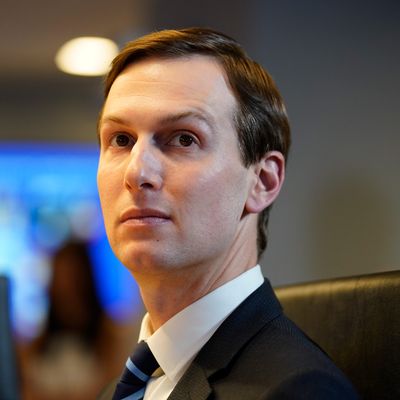
At his coronavirus press briefing yesterday, Fox News correspondent John Roberts asked President Trump about his 2018 decision to eliminate the National Security Council’s pandemic-response office. Trump lashed out, “You know that’s a false story, what you just said is a false story … You shouldn’t be repeating a story you know is false,” accusing Roberts of “working for CNN.” (The charge of committing legitimate journalism is the most serious Trump could think to hurl at a Fox News employee.)
The story is not false. Trump did eliminate the job of coordinating a national pandemic response. And the strongest evidence of the damage he did is that this job is now being performed by Jared Kushner.
In May 2018, the top White House official who was focused on pandemic response departed the White House. “The top White House official responsible for leading the U.S. response in the event of a deadly pandemic has left the administration, and the global health security team he oversaw has been disbanded,” reported the Washington Post at the time. Trump and his allies — including then-NSC director John Bolton, who undertook the ill-fated move — have since tried to muddy the waters about these moves, emphasizing the fact that they merely reorganized the National Security Council rather than bluntly firing everybody involved in pandemic response.
It is true that they kept some global-health officials onboard. But one purpose of the reorganization was to deemphasize pandemic response in favor of other priorities. Nobody bothered to deny this at the time. “In a world of limited resources, you have to pick and choose,” an administration official explained to the Post in its 2018 story. “We lost a little bit of the leadership, but the expertise remains.” The pandemic-response office was created in order to give the issue high-level attention. Trump’s team downgraded the office because they thought it needed less attention. In a world of limited resources, you have to pick and choose, and they chose issues other than pandemic response.
The NSC’s remaining global-health staff did sound the alarm about the coronavirus early on, but its warnings did not register with high-level officials. Bolton’s supporters have tried to paint this as a vindication of his reorganization. See, the NSC was still on top of the pandemic! But the fear wasn’t that nobody in the administration would be aware of the next pandemic. It was that the people who would be aware wouldn’t have the leverage and stature within the White House to get pandemic response slotted to the top of the president’s priorities until it was too late. And that is exactly what happened.
The second major role of the pandemic-response coordinator was to have the ability to bring together multiple departments. This is not a criticism available only with the benefit of hindsight. The need was apparent at the time Trump downgraded the department. “Health security is very fragmented, with many different agencies,” J. Stephen Morrison, senior vice-president at the Center for Strategic and International Studies, told the Post in its 2018 story. “It means coordination and direction from the White House is terribly important.”
The void left by that absence is being filled by Kushner. As head of an ad hoc task force, Kushner is “working alongside government officials from FEMA, HHS, and USAID to solve a range of logistical and technical challenges” and “has stepped in to coordinate decision-making at agencies including the Food and Drug Administration and the Centers for Medicare and Medicaid Services,” according to Politico. “I don’t know how our government operates anymore,” one Republican source complains.
For anybody familiar with Kushner’s boundless self-confidence in his ability to master even the thorniest of policy challenges, from modernizing government processes to solving the Israeli–Palestinian conflict, his disposition will come as no surprise. Gabriel Sherman reports that, in one meeting, the presidential son-in-law insisted that he had mastered the problem of ventilator disbursement. “I have all this data about ICU capacity. I’m doing my own projections, and I’ve gotten a lot smarter about this. New York doesn’t need all the ventilators,” Kushner announced, according to someone present.
Reviews of Kushner’s efficacy in this role have varied widely, presumably depending on whether their sources are the officials working with Kushner or the ones whose authority has been stripped away by him. It is at least plausible that, despite his horrendous lack of qualification for the job, the decrepit state of Trump’s government is such that having Kushner run a cobbled-together coronavirus task force is the best available option right now. There is no chance that bringing in a rich kid who happened to marry into the family to direct the federal government’s response to a catastrophic pandemic is an optimal, or even reasonable, management structure.
What his involvement shows is that the concept of the high-level coronavirus-pandemic office was correct. There needed to be a dedicated office capable of alerting the president early, marshaling resources, and coordinating action across numerous agencies. Trump has discovered this only too late.
In a 2018 letter to the president written the day the pandemic-response coordinator left, Senator Sherrod Brown warned, “There needs to be one person at the NSC, with the backing of a capable team, who can coordinate across agencies to ensure that we have the resources necessary to guard against and respond to any outbreak that threatens the United States.” That is almost a word-for-word description of the role Kushner is filling right now.






























